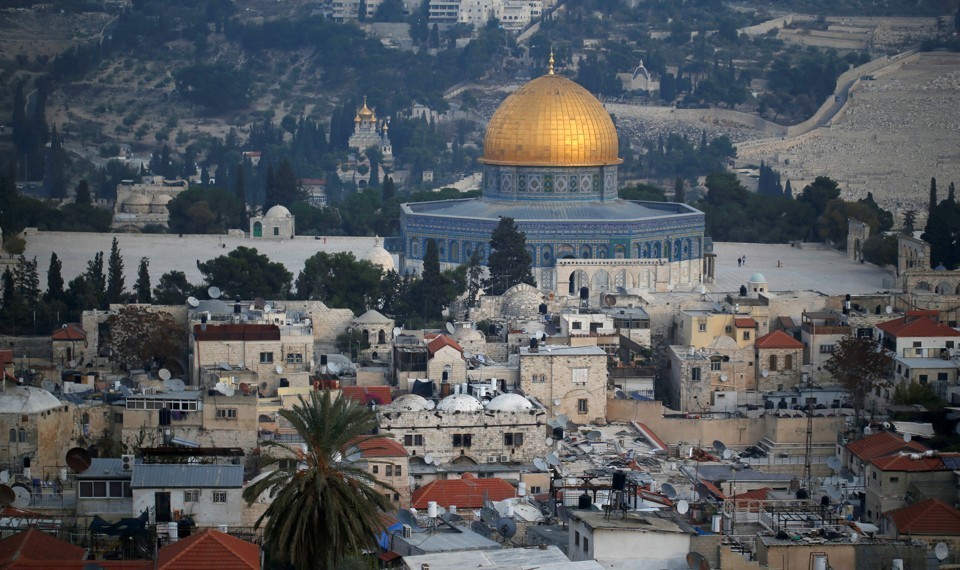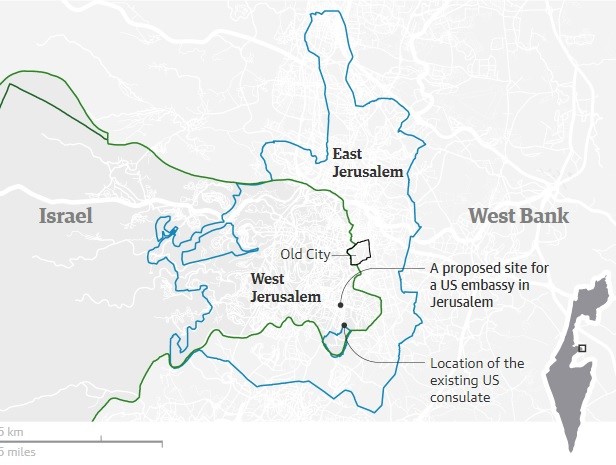What about Palestine?
January 23, 2018 | Expert Insights

As the controversy regarding US President Donald Trump’s recognition of Jerusalem as the capital of Israel escalates, European nations are working to elevate Palestine’s status in the international community. According to reports, Slovenia plans on recognizing Palestine as an independent on February 2018. Luxembourg, Ireland and Belgium are also contemplating making a similar move in the near future.
Meanwhile, France is also working to elevate Palestine’s status within the European Union.
Background
Jerusalem is a city located on a plateau in the Judaean Mountains between the Mediterranean and the Dead Sea. It is considered to be one of the holiest sites by millions of people across the world (it is considered holy by Christians, Muslims and Jews). Israelis and Palestinians both claim Jerusalem as their capital, as the State of Israel maintains its primary governmental institutions there while the State of Palestine ultimately foresees the city as its seat of power. So far, neither claim is widely recognized internationally. The Battle for Jerusalem occurred from December 1947 to 18 July 1948. As a result, the city was split between Israel and Jordan after the war, Israel ruling West Jerusalem and Jordan ruling East Jerusalem with the Old City.
On December 6th, 2017, US President Donald Trump pivoted from decades’ long US foreign policy and recognized Jerusalem as the capital of Israel. Trump’s announcement triggered a wave of protests and violence across Middle East. More than 10,000 people have protested so far a week after the announcement.
In the wake of the recognition, a vote was held in the United Nations General Assembly for a resolution to condemn the recognition. The international community voted overwhelmingly on behalf of the condemnation. In response, Trump has vociferously criticized the intervention of other nations. The US government also announced that it will be withholding nearly half of the funds it planned on giving to a U.N. Relief and Welfare Agency (UNRWA). The agency serves the needs of Palestinians.

Analysis
Palestinian President Mahmoud Abbas sharply attacked Trump's Middle East peace efforts, saying he would not accept any peace plan from the US after its recognition of Jerusalem as Israel’s capital. The talks between Israel and Palestine last broke down in 2014. This has added another complication to the ongoing conflict between Israel and Palestine.
In lieu of events, reports have emerged that Slovenia plans on recognizing Palestine as an independent on February 2018. Luxembourg, Ireland and Belgium are also contemplating making a similar move in the near future.
Slovenia has already signaled its intent of recognizing Palestine as an independent state. Recently, Parliament Speaker Milan Brglez told Palestinian Ambassador Salah Abdel-Shafi that Slovenia’s recognition of a Palestinian state was “not in doubt,” but just a question of timing. According to a news report from Channel 10, a vote for recognition will first be held by Slovenian parliament’s foreign affairs committee in Slovenia. A vote in the full parliament is expected to be held in February.
The Slovenian ambassador in Tel Aviv, Barbara Sušnik said that a vote recognizing Palestine shouldn’t be viewed as condemnation towards Israel. Susnik noted, “We established friendly relations with Israel more than 25 years ago, and we appreciate them a lot. We’re committed to good relations with Israel. Our embassy in Tel Aviv was opened in the summer of 1994, right after diplomatic relations were established. Unfortunately, Israel never opened an embassy in Slovenia.”
Luxembourg, Ireland and Belgium are also contemplating making a similar move in the near future. Meanwhile, France is working on a deal that will result in a EU free trade agreement with the Palestinians which is similar to the one signed with Israel.
The US government has attracted criticism not only by governments across the world but also prominent leaders. Even Pope Francis has called to sustain the current status quo to maintain peace and order in the region.
Additionally, Palestinian Christians have firmly condemned the US Vice President Mike Pence’s support for the development. They have noted that Pence's brand of evangelical Christianity, with its fervent embrace of modern-day Israel as fulfilment of biblical prophecy, lacks their faith's compassion and justice.
Assessment
Our assessment is that European nations are working on countering the challenges that are likely to arise in the wake of the US recognition of Jerusalem as Israel’s capital. This also indicates that the international community is willing to openly defy and criticize US. There also seems to be growing criticism levelled against US Vice President Pence from moderate Christians who believe this will disrupt any peace brokered in the region.








Comments